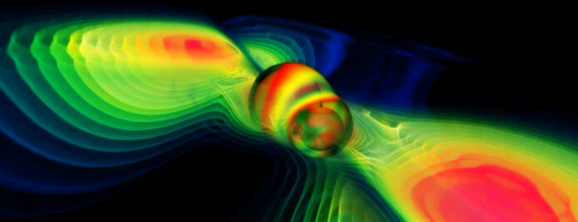What Would Happen if a Small Black Hole Hit the Earth?We can all guess what would happen should a massive black hole drift into our solar system… there wouldn't be much left once the intense gravitational pull consumes the planets and starts sucking away at our Sun. But what if the black hole is small, perhaps a left over remnant from the Big Bang, passing unnoticed through our neighborhood, having no observable impact on local space? What if this small singularity falls in the path of Earths orbit and hits our planet? This strange event has been pondered by theoretical physicists, understanding how a small black hole could be detected as it punches a neat hole though the Earth…
So, picture the scene. The Earth (any planet for that matter) is happily orbiting the Sun. A small primordial black hole just happens to be passing through our solar system, and across Earths orbit. We are all aware of how a rocky body such as a Near Earth Asteroid would affect the Earth if it hit us, but what would happen if a small Near Earth Black Hole hit us? Theoretical physicists from the Budker Institute of Nuclear Physics in Russia, and the INTEGRAL Science Data Center in Switzerland, have been pondering this same question, and in a new paper they calculate how we might observe the event should it happen (just in case we didn't know we had hit something!). PBHs falling into stars or planets have been thought of before. As previously reviewed in the Universe Today, some observations of the planets and stars could be attributed to small black holes getting trapped inside the gravitational well of the body. This might explain the unusual temperatures observed in Saturn and Jupiter, they are hotter than they should be, the extra heat might be produced by interactions with a PBH hiding inside. If trapped within a star, a PBH might take energy from the nuclear reactions in the core, perhaps bringing on a premature supernova. But what if the PBH is travelling very fast and hits the Earth? This is what this research focuses on. I'd expect some catastrophic, energetic event as a primordial black hole hits the Earth. After all, it's a black hole! But the results from this paper are a bit of an anti-climax, but cool all the same. By calculating where the energy from the collision may come from, the researchers can estimate what effect the collision may have. The two main sources of energy will be from the PBH actually hitting Earth material (kinetic) and from black hole radiation. Assuming we have more likelihood of hitting a micro-black hole (i.e. much, much smaller than a black hole from a collapsed star) originating from the beginning of the Universe, it is going to be tiny. Using Hawking's 1012kg black hole as an example, a black hole of this size will have a radius of 1.5×10-15 meters… that's approximately the size of a proton! This may be one tiny black hole, but it packs quite a punch. But is it measurable? PBHs are theorized to zip straight through matter as if it wasn't there, but it will leave a mark. As the tiny entity flies through the Earth at a supersonic velocity, it will pump out radiation in the form of electrons and positrons. The total energy created by a PBH roughly equals the energy produced by the detonation of one tonne of TNT, but this energy is the total energy it deposits along its path through the Earths diameter, not the energy it produces on impact. So don't expect a magnificent explosion, we'd be lucky to see a spark as it hits the ground. Any hopes of detecting such a small black hole impact are slim, as the seismic waves generated would be negligible. In fact, the only evidence of a black hole of this size passing through the planet will be the radiation damage along the microscopic tunnel passing from one side of the Earth to the other. As boldly stated by the Russian/Swiss team:
As this research focuses on a tiny, primordial black hole, it would be interesting to investigate the effects of a larger black hole would have on impact - perhaps one with the mass of the Earth and the radius of a golf ball…?]
Source paper: arXiv send by : mohammad mirzaei |
